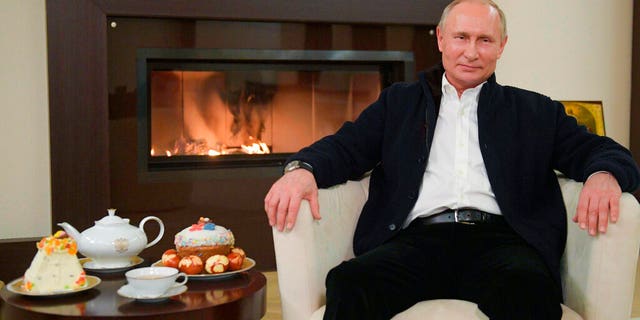Get all the latest news on coronavirus and more delivered daily to your inbox. Sign up here.
Russian President Vladimir Putin is up the creek without a paddle and for the first time it looks like he might know it.
The ex-KGB agent-turned Russian leader with a penchant for marginalizing anyone who gets in his way had all but shored up power to last a lifetime when he announced plans in January to change the country’s constitution, which would have extended his rule.
It was supposed to be a quick vote with few obstacles.
Then coronavirus hit.
WHO IS VLADIMIR PUTIN, THE RUSSIAN PRESIDENT AND EX-KGB OFFICER?
The equalizer crashed Putin’s party and bent his hold over Russians who were confused, scared and dying daily from COVID-19.
In early April, Russia announced it would send a planeload of masks and other personal protective gear to the United States to help fight coronavirus. The delivery sparked criticism and anger from some who claimed Russia was itself experiencing severe shortages of medical items.
“Russia has actually sold the United States masks and medical equipment when doctors and nurses across the country are left without masks and are infecting one another,” Alexei Navalny, a prominent opposition politician, tweeted. “It’s monstrous. Putin is crazy.”
The Alliance of Doctors, a trade union for medical workers, said while it had been collecting money to buy protective gear for Russian doctors and nurses, the same equipment had been shipped to the United States.
“It’s just making a mockery of everything,” AOD wrote on Twitter.
The shipload of equipment is just the latest frustration Russians are having with a leader they claim is out of touch.
From the start, Putin’s response to the pandemic was criticized.
At first, he downplayed coronavirus, reassuring Russians that everything was under control and that the virus which put entire countries on lockdown hadn’t crept across Russia’s borders.
CLICK HERE FOR COMPLETE CORONAVIRUS COVERAGE
When the numbers got too big to ignore, Moscow’s sloppy, disjointed message to its citizens only exacerbated the problem and people started pushing back, taking to the streets in frustration.
On March 30, Moscow Mayor Serge Sobyanin ordered 12 million residents in Russia’s capital to stay inside. By April 13, the city’s health system had been overwhelmed by a spike in COVID-19 cases with dozens of ambulances forming massive lines just to get into the hospitals. One ambulance driver told The Moscow Times he had to wait 15 hours to get in.
Moscow’s Health Department upped fears when it announced the city would run out of intensive care unit beds by the end of April. Then came the accusations from a Russian medical union that said the government was covering up cases and forcing doctors and nurses to treat patients without any protective equipment.
As outrage grew and the need for strong leadership became abundantly clear, Putin stepped out of the spotlight and relegated the crisis response to local and regional officials that have screwed it up spectacularly.
In Komi, a remote Russian region that trails only Moscow in per-capita coronavirus infections, government workers have not been warning residents about the risks of COVID-19 or working to allay fears. Instead, they have wasted time launching an investigation into who leaked the bad news about the novel coronavirus.
Tatiana Stanovaya, a scholar at the Carnegie Moscow Center and founder of R. Politik. Reality of Russian Politics, said coronavirus has underscored Putin’s isolation from the majority of Russians and has put the durability of his regime to the test.
“He has only addressed the nation twice, both times briefly, and visited a hospital, but has not proposed an action plan, sticking instead to disjointed measures,” she wrote. “There has been no dramatic appeal, no empathy or call to mobilize.”
It seems Russians are taking note.
Levada Center, an independent pollster, said Putin’s approval rating has fallen from 69 percent in February to 63 percent in March. That’s a sharp drop from the 68 to 70 percent Putin is used to seeing. For comparison, in March 2014, following Russia’s annexation of Crimea, Putin’s approval rating soared to 80 percent.
“Public opinion doesn’t rate Putin’s crisis management skills very highly,” Andrei Kolesnikov, senior fellow at the Russian domestic politics and political institutions program at Carnegie Moscow Center, recently wrote.
While Putin hasn’t been relatable too often, his video message to Christians on Orthodox Easter this weekend did drive home the point.



Russian President Vladimir Putin offers holiday wishes on the Orthodox Easter at the Novo-Ogarevo residence outside Moscow, Russia, Sunday, April 19, 2020.
(Kremlin Pool Photo via AP)
Russia’s leader delivered his Easter message as he sat in front of a fireplace with painted Easter eggs, a traditional Orthodox Kulich sweet bread and a porcelain teapot by his side.
“All levels of power are working in an organized, responsible and timely way,” he said.
On the day he made those comments, Russia had reported 6,060 new cases of COVID-19 within a 24-hour period.
In a sign that Putin may be bowing to public pressure, he postponed the vote on the constitution change that would let him stay in power until 2036, moving the date from April 22 to “a later date.”
CLICK HERE FOR THE FOX NEWS APP
“It’s a recognition of how difficult the situation could get in Russia,” Ben Noble, a Russia expert at University College London told Foreign Policy. “[The Kremlin] wanted to make the vote as fast as possible, because they know public opinion about it will only sour over time.”
Even though Moscow has gotten good in recent years at responding to threats, both foreign and domestic, tackling coronavirus could be the fight neither the Russian system nor its leader can conquer.

